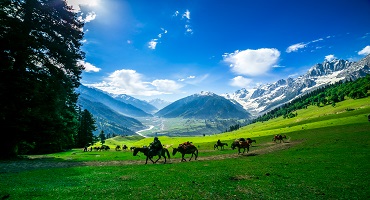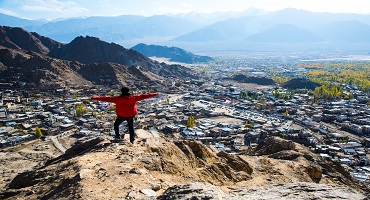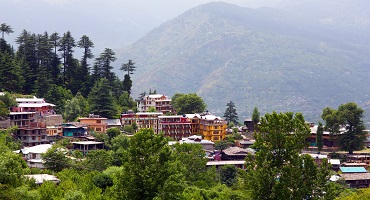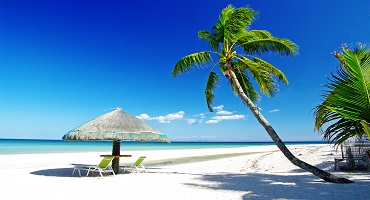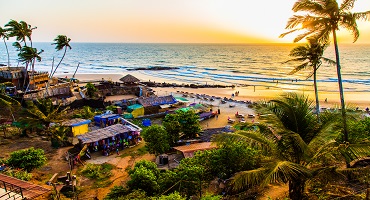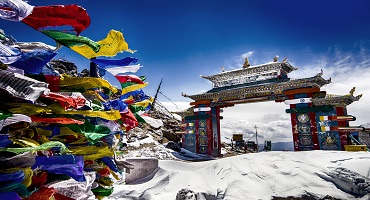It’s hard to define what Africa truly is, simply because it cannot be boxed into one, particularly category. It’s not just a continent, it’s an entire galaxy with stars and planets of its own. More than a mere holiday destination, Africa is an experience that one would have to undertake wholeheartedly – devoid of any inhibitions. In order to fathom the sheer complexity, diversity, beauty and vastness of the world’s most populated region, one would have to plunge into its jungle book of countries, cities, towns and villages! One would have to dine with the lions, trumpet with the elephants, drink with the wilder beasts, run with the leopards, sing with the hyenas and dance with ostriches. From the spicy glamour of Morocco to the royal mystique of Egypt, picture-perfect serenity of Seychelles and adrenaline-pumping thrills of Tanzania, there’s not much left to the imagination.
And as infinite as its offerings are, its weather is far more complex. In order to provide an easy to understand/easy to navigate guide on the best time to visit Africa, we’ve organised the information on the basis of the north, south, east-west and central regions of Africa. This is because each region is distinct in its climate and offerings.
Read further for a concise break of each!
Disclaimer – The seasons, temperatures and climatic conditions are estimates and can vary. Please, complement this guide with some research of your own for a thorough understanding of when to visit this continent.
Best Time to Visit North Africa
|
Month
|
Average Temperature
|
Season
|
|
March – May
|
8-32°C
|
Spring
|
|
June – August
|
16-40°C
|
Summer
|
|
September - November
|
11-32.5°C
|
Autumn
|
|
December - February
|
6.5-21°C
|
Winter
|
Temperature – North Africa’s temperatures fluctuate according to the season and region in question. The aforementioned table summarises the 4 seasons and its average temperature range.
Weather – North Africa experiences an arid climate, with sky-high temperatures and minimal precipitation. The weather is heavily influenced by the cold Atlantic winds, the Sahara Desert and the vast mountain ranges.
Significance – You will discover many fascinating festivals across each season in North Africa. For instance, autumn’s Fez Festival of Culinary Arts is simply enriching, winter’s Sphinx Festival is magical and summer’s Tunis Medina Festival is thrilling!
Why you should visit – From the golden pyramids of Egypt to the glittering markets of Morocco and the exquisite mosques of Algeria, one has much to navigate in this region of Africa. When it comes to exploration of the royal Egyptian civilisation, the best season to visit North Africa is in winter as it’s more conducive for visits to tombs and monuments.
Things to know before the visit – The summer months constitute North Africa’s driest season, with zero rainfall and scorching temperatures. If you’re considering traveling this month, you might want to visit the beaches or the mountains.
Tips – Pack according to the season you’re visiting in. For instance, light and airy clothing during the hot season and thick clothing during the cold season. Depending upon the region, you may also require umbrellas/windcheaters. Always have mosquito repellent and sunscreen in your backpacks!
Best Time to Visit Southern Africa
|
Month
|
Average Temperature
|
Season
|
|
March – May
|
8-30°C
|
Spring
|
|
June – August
|
6-29°C
|
Summer
|
|
September - November
|
6-29°C
|
Autumn
|
|
December - February
|
2-31°C
|
Winter
|
Temperature – Southern Africa’s temperatures fluctuate according to the season and region in question. The aforementioned table summarises the 4 seasons and its average temperature range.
Weather – Southern Africa experiences a more temperate climate as compared to north, east and west. While most of this region witnesses dry weather and limited rainfall, other parts are endowed with lush greenery, courtesy of the rainy season.
Significance – Southern Africa is full of cultural surprises. The confluence of seasons and countries result in delightful festivals such as spring’s Cape Town Jazz Festival and South African Cheese Festival, summer’s Feria Oramena Festival, autumn’s Simunye Country Fair and winter’s Christmas markets.
Why you should visit – From the sepia savannah plains to the pearl-white beaches and violet mountain ranges, Southern Africa is an amalgamation of a million different shades. One can glimpse gorgeous species of animals, insects, flowers and plants, amidst brilliant landscapes.
Things to know before the visit – Despite the occurrence of thunderstorms, December is the peak holiday season in the southern region’s most popular country - South Africa. If you’re traveling to this exciting destination during this time, be sure to make all your bookings in advance.
Tips – Take into consideration the season as well as region you’re visiting. Depending upon the time of year and geographical landscapes of the country, you’re clothing, and travel requirements will change. Make sure you have sunscreen and mosquito repellent in hand.
Best Time to Visit East Africa
|
Month
|
Average Temperature
|
Season
|
|
March – May
|
10.5-30°C
|
Spring
|
|
June – August
|
10.5-28°C
|
Summer
|
|
September - November
|
7-32°C
|
Autumn
|
|
December - February
|
7-31°C
|
Winter
|
Temperature – East Africa’s temperatures fluctuate according to the season and region in question. The aforementioned table summarises the 4 seasons and its average temperature range.
Weather – East Africa’s weather is defined by its distinct wet and dry seasons. Its long dry season begins in July and lasts until October. During this time the climate is blessed with warm sunshine and rain free days! The region’s short dry season occurs from January to February. March to May and November to December, on the other hand, mark the wet period!
Significance – From Fasika (Easter) to Meskel (Finding of the true cross), Timkhat (Ethiopian epiphany) and Enkutatash (New Year), one can truly immerse themselves in the charming seasons and its accompanying holidays!
Why you should visit – From the mystical rock cut churches of Ethiopia to the ethereal landscapes of Serengeti (that can be glimpsed from a colourful hot air balloon), East Africa will cast a spell on you! Its exotic wildlife, gorgeous natural marvels and delectable cuisine will have you coming back for more.
Things to know before the visit – July to October is the best time to visit East Africa, for its world famous safari destinations such as Serengeti and Maasai Mara. April to May, however, should be avoided by visitors if they’re planning to visit the rainforests of Rwanda and Uganda.
Tips – Make preparations according to the season you’re travelling in. For instance, light and airy clothing during the hot season and warm clothing during the cold season. Depending upon the specific country, you may also require rain gear! Mosquito repellent and sunscreen are extremely important items to have.
Best Time to Visit West Africa
|
Month
|
Average Temperature
|
Season
|
|
March - May
|
15-35°C
|
Spring
|
|
June - August
|
18-30°C
|
Summer
|
|
September - November
|
18-32.5°C
|
Autumn
|
|
December - February
|
15-34°C
|
Winter
|
Temperature – West Africa’s temperatures fluctuate according to the season and region in question. The aforementioned table summarises the 4 seasons and its average temperature range.
Weather – Much like central Africa, western Africa adopts a monsoon climate that is distinguishable by its steep temperatures, inclining humidity and unrelenting seasonal showers.
Significance – Get lost in the mystical world of West African celebrations with Panafest, Festival of Masks, Festival au Desert, Calabar Festival and Voodoo Festival! Pan season, one will definitely find a festival to coincide with their time travel.
Why you should visit – West Africa is a treasure trove of history, heritage and culture, as can be seen in its awe-inspiring architecture. From Niger and Mali’s innovative mud structures to Goree Island’s infamous slave forts and Canary Islands beach resorts and Las Palmas shops, travellers will discover an eclectic world.
Things to know before the visit – The dry season is susceptible to the harmattan - a dusty and dry trade wind that journeys from the Sahara Desert. We’d advise you to be careful, while outdoors, during the months of November to April.
Tips – Gear up for the sticky humidity and pitter patter, which means carrying light cotton clothing, rain gear and that much needed mosquito repellent!
Best Time to Visit Central Africa
|
Month
|
Average Temperature
|
Season
|
|
March - May
|
19-38°C
|
Spring
|
|
June - August
|
18-33°C
|
Summer
|
|
September - November
|
16-34°C
|
Autumn
|
|
December - February
|
14-34°C
|
Winter
|
Temperature – Central Africa’s temperatures fluctuate according to the season and region in question. The aforementioned table summarises the 4 seasons and its average temperature range.
Weather – Central Africa experiences variable weather conditions. While regions near the equator are hot and humid all year round, regions further away experience the relief from the rain. Similar to west Africa, central Africa leverages monsoon climatic conditions that are characterised by its rocketing temperatures, ascending humidity and heavy seasonal showers.
Significance – Central Africa bustles with colourful and vibrant celebrations during Easter, Independence Day, Christmas and New Year! Partaking in these animated festivities gives unique insight into how this distinct region interprets sacred and auspicious world festivals!
Why you should visit – Plush rainforests laden with endangered species of animals, magnetic volcanoes and beautifully chaotic cities entice tourists towards visiting central Africa. Some of the world’s best national parks can be found in the confines of this sprawling and multisensorial region.
Things to know before the visit – The best climate to visit Central Africa in is during the dry season, especially for regions such as the DRC. During this time, the weather is significantly less humid, the roads are in decent condition and harmful mosquitoes are few and far.
Tips – Be ready for diverse weather conditions and extremities. Pack a variety of clothing that accounts for the dry and wet seasons respectively. Don’t forget to carry mosquito repellent and sunscreen!
From Tarzan to Simba, King Julian and Black Panther, this glorious continent is home to all our favourite characters. So, are you ready to experience this all? Go through our Africa Holiday Packages and dive into this continent’s storybook magic!

